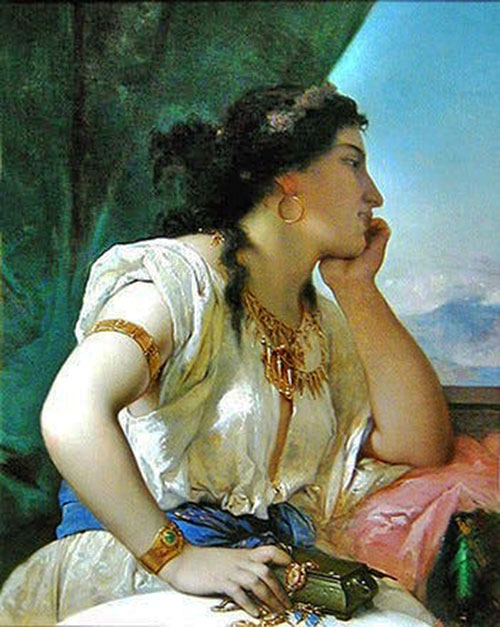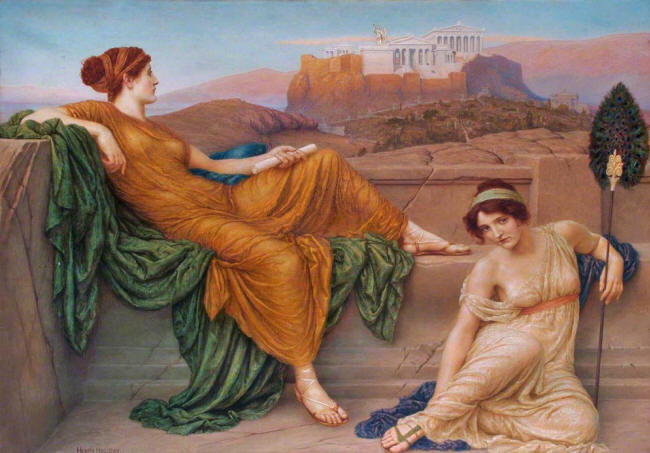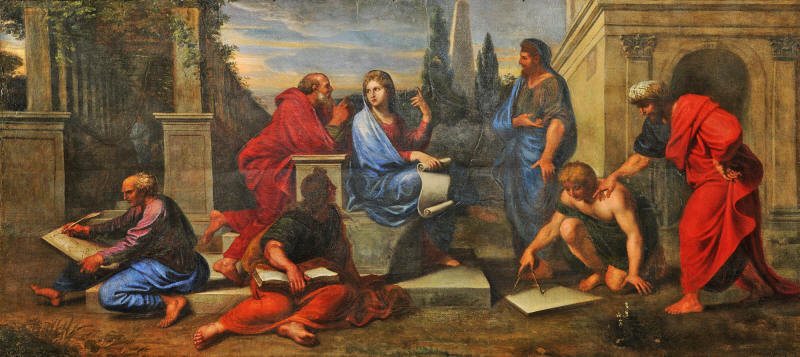|

by Van Bryan
March 21, 2025
from
ClassicalWisdom Website

Aspasia of Miletus
by Pierre Olivier
Joseph Coomans
It most certainly wasn't easy being a woman during the ancient
times.
The classical age certainly had a lot going for
it.
After all, it's been argued that the ancient
thinkers laid the foundation for over two thousand years of
progress in fields like philosophy, literature, historiography,
and theatre.
However, progressive rights for women would not
be listed among these accomplishments.
Even in Athens, which was the intellectual
and cultural hub of the classical age, women were often
relegated to the home.
Not allowed an education, the right to vote, or
to participate in public discourses, the highest aspiration a woman
could reasonably hope to achieve was to become a wife and bear
children.
To an extent, we just have to accept that...
It is rather easy for us now, blessed with
thousands of years of societal evolution, to look back on the
classical civilizations and think ourselves above them.
However, it takes a more nuanced mind to recognize that whatever
advancements we have made as a species was only made possible
because there were brave individuals, sometimes thousands of years
in the past, who took the first meager steps toward progress.
Even with all that in consideration, we must realize a woman's lack
of rights in ancient times means that there are very few notable
women who pop up on the classical timeline.
After all, it's hard to shape the direction
of Western society when you are viewed as little more than
property.
The ones who do catch the attention of history, therefore, are
made all the more remarkable.
Aspasia of Miletus was one
such woman.
She is perhaps best described as a political
woman who possessed a knack for rhetoric, a taste for philosophy,
and the ear and heart of the most powerful statesman of classical
Athens.
Aspasia was venerated and denigrated by the ancient writers.
Viewed by some as a shrewd political player, by
others as nothing more than a harlot, it was said that she was the
lover of Pericles, the great aunt of Alcibiades, the supposed
author of Pericles' famous "funeral oration", she was even reported
to have taught Socrates a few lessons in philosophical
argumentation!

Aspasia on the Pnyx
(1888) by Henry
Holiday
Even though all of our sources on this mysterious woman are less
than reliable, perhaps even down right fallacious, the fact that
such controversy surrounds her makes her a prime candidate for our
inspection, and perhaps even admiration.
It was said that Aspasia was born to the historically important
island of
Miletus off the coast of Asia Minor
sometime in the early fifth century BC.
She must have been born to a wealthy family, for
it is reported that she received a first-rate education, a rare
thing for a woman in ancient times. It is important to note that
these two statements are the only two pieces of universal concord
surrounding Aspasia.
That isn't to say that everything else is
hearsay, but it sure isn't historical fact. We are just going to
have to take a leap of faith on this one.
We can be rather certain that Aspasia traveled to Athens sometime
around 440 BC.
One hypothesis suggests that she made the journey
while in the company of her sister and new brother-in-law,
Alcibiades II (grandfather to the famous general of the same name).
If this hypothesis were true, it would explain
how Aspasia came to know Pericles, a man who had close ties to the
Alcibiades family.
Once in Athens, it is believed that Aspasia became a hetaira
(ἑεταίρα) and probably ran a brothel.
Hetairai (plural form of hetaira) were not
common prostitutes.
Rather, they were highly educated, highly
sophisticated courtesans who would have been skilled at dance, song,
conversation, and would have likely been present in the inner
circles of powerful, affluent men.
Hetairai were probably the closest thing to
liberated
women during this time.
They were allowed to pursue education, engage
in civic debate, they even paid taxes!
Additionally, Aspasia had the advantage of
being a foreigner.
This meant she was forbidden to marry an
Athenian citizen.
A consequence of this was that Aspasia would
not have been bogged down by the restrictions placed upon
married women.
She was free, therefore, to explore the societal
landscape of the Athenian elite, and explore she most certainly did.
Aspasia is perhaps best remembered as the lover of Pericles.
After the famed Athenian general divorced his first wife, he came to
live with Aspasia.
And while it is assumed that the two were never
married, we do know that Aspasia gave Pericles a son who was
bestowed with his father's name.
While we might assume that the statesman was attracted to Aspasia
for her physical beauty, Plutarch tells us that he truly
loved the woman and devoted himself entirely to her.
"...he (Pericles) took Aspasia, and loved her
with wonderful affection; every day, both as he went out and as
he came in from the market-place, he saluted and kissed her."
Plutarch (Life of Pericles)
It is suggested, however, that Pericles might
have been too devoted to Aspasia. It is likely that she advised, or
otherwise persuaded, Pericles to take specific actions within his
role as strategos (general).
Plutarch seems to believe that Pericles might
have been motivated to declare war on the island of Samos simply
because they were attacking Aspasia's hometown of Miletus.
"Pericles, however, was particularly charged
with having proposed to the assembly the war against the Samians,
from favour to the Milesians, upon the entreaty of Aspasia."
Plutarch (Life of Pericles)
While in the company of Pericles, it was said
that Aspasia's home became something of a hub for prominent Athenian
figures.
Generals, poets, even the philosopher
Socrates was said to have visited Aspasia and Pericles' home
on a number of occasions...
Aspasia's connection to Socrates is significant,
because there is evidence to suggest that she might have been one of
the philosophers first, and best, teachers in the art of rhetoric.
Plato says as much within his dialogue,
Menexenus.
"That I should be able to speak is no great
wonder, Menexenus, considering that I have an excellent mistress
in the art of rhetoric, - she who has made so many good
speakers, and one who was the best among all the Hellenes."
Socrates (Plato's Menexenus)
It is even suggested within this dialogue that
Aspasia, not Pericles, was the true author of the now famous
"funeral oration", found within the pages of Thucydides'
History of the Peloponnesian War.
"I heard Aspasia composing a funeral oration
about these very dead.
For she had been told, as you were saying,
that the Athenians were going to choose a speaker, and she
repeated to me the sort of speech which he should deliver,
partly improvising and partly from previous thought, putting
together fragments of the funeral oration which Pericles spoke,
but which, as I believe, she composed."
Socrates (Plato's Menexenus)
We must consider the possibility that Plato's use
of Aspasia in this dialogue was intended as a humorous device.
The idea of a woman teaching rhetoric to a
man?
Ha! How fanciful...!

Aspasia surrounded by Greek
philosophers
(1670) by
Michel Corneille the Younger
Still, the fact that Plato felt Aspasia's name was worthy of
mentioning at all speaks volumes for the type of reputation she must
have had as a rhetorician.
Additionally, there are other sources that claim Aspasia was well
versed in what would become known as Socratic dialogue, and
may even have taught Socrates a thing or two about winning an
argument.
Cicero tells us that Aspasia might have been the one to teach
Socrates the rhetorical tool Inductio, or getting people to
agree to a statement by having them agree previously to similar
statements.
Cicero writes of a supposed conversation between Aspasia, a man
named Xenophon (not the historian), and Xenophon's wife.
"Please tell me, wife of Xenophon, if your
neighbor had a better gold ornament than you have, would you
prefer that one or your own?"
"That one, " she replied.
"Now, if she had dresses and other feminine finery more
expensive than you have, would you prefer yours or hers?"
"Hers, of course," she replied.
"Well now, if she had a better husband than you have, would you
prefer your husband or hers?"
At this the woman blushed.
But Aspasia then began to speak to Xenophon.
"I wish you would tell me, Xenophon," she
said, "if your neighbor had a better horse than yours, would you
prefer your horse or his?"
"His" was his answer.
"And if he had a better farm than you have, which farm would
your prefer to have?"
"The better farm, naturally," he said.
"Now if he had a better wife than you have, would you prefer
yours or his?"
And at this Xenophon, too, himself was silent.
Then Aspasia:
"Since both of you have failed to tell me the
only thing I wished to hear, I myself will tell you what you
both are thinking.
That is, you, madam, wish to have the best
husband, and you, Xenophon, desire above all things to have the
finest wife.
Therefore, unless you can contrive that there
be no better man or finer woman on earth you will certainly
always be in dire want of what you consider best, namely, that
you be the husband of the very best of wives, and that she be
wedded to the very best of men."
Cicero (De Inventione)
By having her listeners assent to questions with
similar circumstances, she entraps her opponent into conceding a
later, sometimes embarrassing, admission that proves her point.
This was a technique that Socrates would
make famous several years later.

Aspasia Conversing with Socrates
and Alcibiades
(1801) by
Nicolas André Monsiau
It is perhaps unsurprising that Aspasia, with her keen political
mind and ability to outmaneuver men during conversation, would
garner some personal attacks.
Plutarch tells us in Life of
Pericles that the Athenian comic playwright Cratinus
referred to Aspasia as "a harlot" in one of his plays.
Additionally, she was put on trial by the
comedian Hermippus.
She was accused of impiety and of corrupting
the women of Athens with her strange and unhealthy life style.
Interestingly, these charges were remarkably
similar to the ones lodged against Socrates in 399 BC.
Unlike
Socrates, Aspasia was saved from execution by a rare emotional
outburst from Pericles...
Other ancient critics, Plutarch only refers to them as "some of the
Megarians", believed that many of Pericles' military blunders were
actually the fault of Aspasia.
A woman, after all, ought to have no place in
military affairs...!
It is suggested, however, by the author and modern historian
Madeline Henry that Aspasia's critics would have had their own
personal reasons for attacking the outspoken woman.
After all, a political woman in the age of
classical Athens was a subject of great frustration for many
powerful men.
Even with her critics, Aspasia enjoys a sterling reputation in our
modern age. She was arguably one of the most important intellectual
figures during the height of Athenian power, and she was undoubtedly
the most remarkable woman to have ever lived during that age.
She is perhaps best described by Lucian in his A Portrait
Study...
"We could choose no better model of wisdom
than Milesian Aspasia, the admired of the admirable 'Olympian';
her political knowledge and insight, her shrewdness and
penetration, shall all be transferred to our canvas in their
perfect measure."
|





